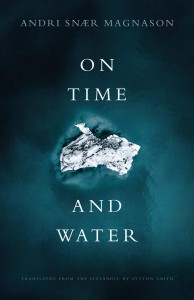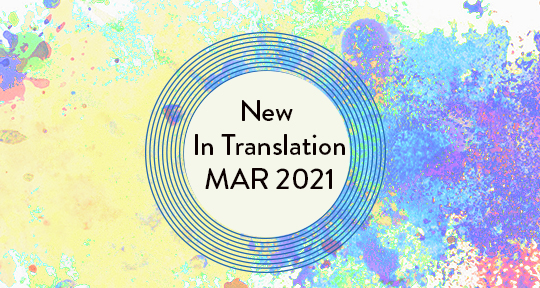This month, our selection of excellent new publications are representative of literature’s capacity for translating worldly phenomenon into language, converting the lived into the understood. From Iceland, a passionate and intimate call to response on the tragedies of environmental destruction; from Palestine, a monumental work of love and resistance from “the Virginia Woolf of Palestine,” Sahar Kalifeh; from Algeria, a sensual novel that treads the tenuous territory of colonialism’s aftereffects; and from Japan, the English-language debut of Akutagawa-winner Kikuko Tsumura, who with graceful humour and intrigue tackles the toxic concept of labour in the thrive of capitalism.

On Time and Water by Andri Snær Magnason, translated from the Icelandic by Lytton Smith, Open Letter, 2021
Review by Rachel Farmer, Chief Executive Assistant
When Greta Thunberg addressed the UN Climate Summit in September 2019, she choked back tears as she uttered the now infamous words: “How dare you?” Reactions to this display of emotion were mixed to say the least. Some showed discomfort, others concern for her wellbeing; some dismissed her outburst as manipulative, others ridiculed her. Her face and words were even immortalised in meme format. In displaying her anguish and rage so plainly, Thunberg violated the unspoken rule that seems to underpin much of the communication and discussion around climate change, wherein impassivity, stoicism, and detachment reign supreme.
In On Time and Water—part memoir, part interview, part impassioned treatise on the future of our planet—Andri Snær Magnason follows the young Swedish activist’s example, casting aside convention and delving into the emotional side of the climate crisis. In doing so, he embarks on a deeply humane and vulnerable exploration of what manmade climate change truly means for the planet—and for us. In this compelling hybrid of a book, translated sensitively by Lytton Smith, he explains how, a few years ago, he was called upon to defend a region in his country’s highlands from being destroyed in the name of energy production. Despite his deep admiration for the spiritual fervour with which Helgi Valtýsson, another Icelandic writer, wrote about the region in 1945, Magnason found himself unable to infuse the same passion into his defence. Bringing emotions into the discussion would have risked his arguments being dismissed as hysterical, doommongering, or hopelessly idealistic.
I’d found myself overwhelmed by melancholy at the unruly devastation that washed out this peerless region, yet I chose words that seemed moderate and inviting to readers. I used the prevailing language of liberalism, innovation, utilitarianism, and marketing. I discussed the area’s importance for Iceland’s image, its potential tourist income, the area’s research value, how the highlands were a magnet for foreign currency as a filming location for movies or commercials. [. . .] We live in times when money is the measure of reality. I couldn’t argue nature’s right to exist, its essential value, by saying that we might find God’s all-encompassing expanse there. READ MORE…


